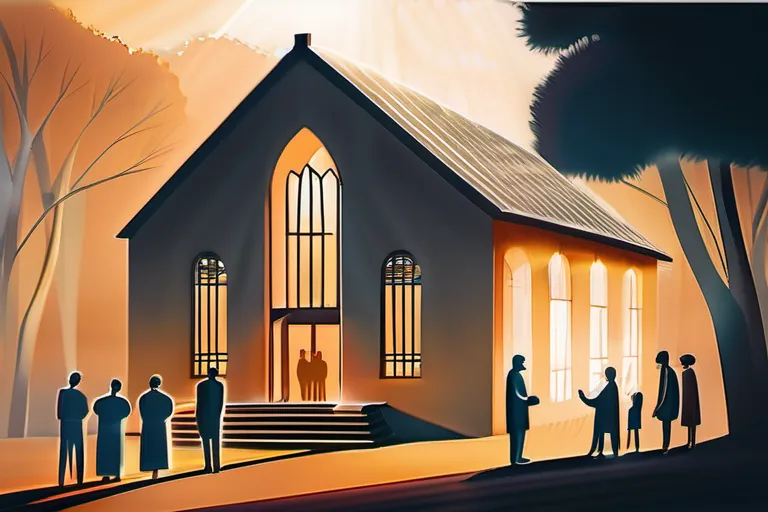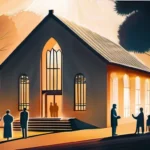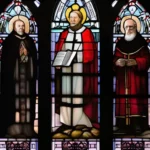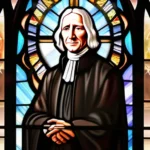Explore the core beliefs, practices, and history of the Religious Society of Friends (Quakers)
The Religious Society of Friends, commonly known as Quakers, is a Christian denomination that originated in the 17th century. This article delves into the fundamental beliefs, practices, and history of this unique religious group.
The Origins of Quakerism
The Religious Society of Friends, commonly known as Quakers, has a fascinating and rich history that spans over three centuries. Let’s delve into the origins of this unique movement by exploring its birthplace—England in the 17th century.
What sparked the formation of Quakerism? It was during the turbulent period known as the English Civil War, a time marked by religious and political upheaval. A young man named George Fox felt deeply disillusioned with the established churches, finding their practices and teachings insufficient to his search for spiritual truth.
Can you imagine feeling so discontented that you embarked on a journey of self-discovery? That’s exactly what George did. He traveled extensively, preaching and writing about his experiences and beliefs, eventually leading to the formation of Quakerism in 1652 when he had an epiphany at a meeting in Pendle Hill, England.
The early Quakers faced severe persecution for their unconventional views and practices. They were often arrested, imprisoned, and even tortured. Yet, they continued to spread their message of equality before God and direct experience with the divine through silent meetings and simple worship.
How did Quakerism spread beyond England? As Quakers moved into America, they brought their beliefs and practices with them, establishing communities in Pennsylvania under William Penn. Over time, Quaker principles of peace, simplicity, integrity, and equality influenced not just religious practices but also social reforms, including the abolitionist movement and women’s rights.
Through all these challenges and triumphs, one thing remains clear: Quakers have always been driven by a commitment to live in accordance with their beliefs. Their journey is a testament to the power of individual conviction and the enduring quest for spiritual truth.
Quaker Beliefs: The Inner Light
Imagine a world where every individual is seen as a vessel, holding within them a light that guides and illuminates their path. This is at the heart of Quaker beliefs, specifically the concept known as the Inner Light. How can such an idea shape a whole community’s spirituality? Let’s delve into its profound significance.
The Inner Light is a belief that every person is imbued with divine wisdom and guidance. For Quakers, this light is not just a metaphor; it is a lived experience, a presence that speaks to the soul through direct revelation. This means that in their spiritual practice, Quakers seek direct communication from God without the need for intermediaries like priests or complex religious rituals.
Consider this: if you were walking in a dense forest and suddenly heard a whisper urging you towards a clear path, would you dismiss it? For Quakers, the Inner Light is much like that whisper. It guides them through life’s complexities, offering wisdom and direction at every turn. This belief encourages an open, humble approach to learning from one’s experiences and the teachings of others.
The practical application of this belief can be seen in how Quakers conduct their meetings for worship. They sit in silence, waiting for that leading, or the presence of the Inner Light, to guide them. When someone feels moved by the light, they may speak, sharing what they feel called to say. This practice emphasizes equality and the belief that everyone has something valuable to contribute.
The Inner Light also plays a crucial role in Quaker social activism. With its emphasis on truth, Quakers have historically been at the forefront of many progressive movements, from abolition to women’s suffrage and beyond. The light compels them to act upon what they believe is right, often facing opposition and risking their own safety.
In essence, the Inner Light is not just a belief; it’s a way of life that challenges us to look within ourselves for guidance and then act on that inner voice. It invites us all to be more than mere observers in our lives and communities, but active participants driven by a higher purpose.
The Practice of Silent Worship
The practice of silent worship in Quaker meetings is both profound and transformative, much like a journey into one’s own heart. Imagine walking into a meeting house, stepping onto a carpeted floor that feels softer than a bed but sturdier than a ship, as if it’s inviting you to anchor your soul. In these hallowed halls, the air seems charged with a quiet anticipation—what could be more sacred than the silence itself?
During silent worship, Friends gather in a circle or semi-circle without formal seating arrangements, allowing everyone to participate equally. This setup mirrors the Quaker belief that every person carries The Light of Christ within them. Just as in a crowded room where only one person can speak at a time, during silent worship, only one person speaks at a time, often after becoming still and quiet, almost meditative. It’s as if everyone is tuning into the same frequency, waiting for a message or inspiration to arise from the silence.
When someone does rise to speak, it’s not uncommon for others to simply listen, nod their heads in agreement, or perhaps take notes. This practice of listening without judgment fosters a deep sense of community and equality. It’s like holding hands with everyone in the room, feeling the interconnectedness that binds us all together. Through this shared experience, Quakers strive to hear God’s voice directly, unfiltered by any hierarchy or doctrine.
Silent worship is not about waiting for someone else to lead; it’s an invitation to let go of external guidance and trust in one’s inner wisdom. It’s a powerful reminder that we all have the potential to be ministers and teachers, simply by being present and open to the divine. This practice isn’t just about listening but also about understanding how our silence can speak volumes—how sometimes it is more meaningful to be quiet than to fill the air with words.
As you step out of a Quaker meeting after silent worship, you carry with you a sense of renewal and clarity. The experience leaves you wondering what else in life might benefit from such deep listening and quiet contemplation. Silent worship is not just a practice but a reminder to find peace within oneself and share that peace with the world.
Quaker Beliefs: Peace Testimony
Imagine a world where every individual’s voice matters, and violence is nothing but a distant echo. That’s what Quakers believe in when it comes to their Peace Testimony. This testimony, deeply rooted in the core beliefs of the Religious Society of Friends (Quakers), is more than just a declaration—it’s a way of life that guides every action and decision.
The Peace Testimony is often seen as one of Quakerism’s most distinctive features. It stems from the belief that there are no true followers without true peace, both within oneself and among all people. How can we truly love our neighbors if we allow war and conflict to consume us?
In practice, this means embracing nonviolent solutions to conflicts, promoting peacemaking through dialogue, and actively working against injustice. Quakers often participate in peace vigils, support victims of violence, and even refuse to bear arms. Is it not easier to forgive than to fight?
The impact of this testimony has been profound. Throughout history, Quakers have stood at pivotal moments when the world needed a voice for peace. From the abolitionist movement in the 19th century to the civil rights activism of the mid-20th century, and even today’s efforts against global conflicts, Quakers continue to advocate for peaceful resolutions.
But the Peace Testimony is not just about reacting to conflict; it’s also about preventing it. By focusing on education, social justice, and community-building, Quakers aim to create a world where harmony prevails over strife. Can we build a society where peace is more than just a dream?
The journey towards achieving this vision is never-ending. Every day, Quakers strive to live their beliefs in small yet significant ways—through acts of kindness, through speaking up against oppression, and through the silent witness of their actions. This testimony serves as a beacon, reminding us all that true peace begins with each one of us.
Equality and Social Justice in Quakerism
Imagine a world where everyone stands equal before God and humanity. That’s the core belief that has driven Quakers to become pioneers in social justice movements. How does one explain their unwavering commitment to equality? It all comes down to their profound sense of interconnectedness with every individual soul, seeing them as children of the same divine parent. This unique perspective shapes everything from their daily interactions to their involvement in major societal issues.
Quakers have long been at the forefront of advocating for human rights and equality. One can ask: how did they manage this? It stems from their belief that there is a spark of the divine in every person, known as “that of God.” This belief encourages them to treat everyone with respect and dignity, regardless of their background or status.
Their activism spans centuries, from abolitionism in the 18th and 19th centuries to modern-day human rights struggles. The Quakers were among the first to publicly oppose slavery, arguing that all people are created equal and deserving of freedom. They also played crucial roles in the women’s suffrage movement, recognizing the inherent worth and equality of both men and women.
Consider how their approach to social justice differs from other religious groups. Rather than waiting for external leaders or governments to make changes, Quakers believe in taking personal responsibility. This means that every member can and should work towards creating a more just society. It’s like planting seeds of peace and equality wherever they go, knowing that small actions can grow into something much larger.
From addressing racial discrimination to supporting LGBTQ+ rights, Quakers have continually adapted their activism to meet the challenges of each era. Their commitment is not just about fighting for justice but also fostering understanding and unity among diverse communities. By embracing this spirit of inclusion and equality, they continue to inspire others to join them in creating a world where everyone’s voice is heard and valued.
The Role of Service in Quaker Beliefs
Imagine Quaker beliefs as a vast, open field where every individual has their own path to truth and God. At the heart of this spiritual landscape lies a central tenet that resonates through every leaf and blade: service. But what exactly does service mean in the context of Quakerism? And why is it such an integral part of their beliefs?
In many ways, service to others mirrors the act of tending to a garden. Just as a gardener nurtures plants, ensuring they receive water and sunlight, so too do Quakers strive to care for those in need. This approach is not just about charitable acts; it’s a profound way of living out one’s faith in daily life. By serving others, Quakers believe that they are fulfilling their role as stewards of the earth and its inhabitants.
Consider the metaphor of a ship sailing through turbulent waters. Each crew member plays a vital role in keeping the vessel steady and safe. Similarly, in Quaker communities, every individual contributes to the collective effort to support one another and the wider world. This interconnectedness highlights how service is not just an individual endeavor but a communal responsibility.
Moreover, this concept of service transcends mere acts of kindness or charity. It embodies a deep commitment to justice and equality. Quakers often find that their urge to serve leads them into social activism, as they see the needs of the community and strive to address systemic issues. This dedication can be seen in various historical movements where Quakers have been at the forefront, fighting for civil rights, peace, and environmental conservation.
So, how does one integrate service into their Quaker practice? The answer lies in living a life that reflects humility, compassion, and resilience. Whether it’s volunteering at a local food bank, participating in community clean-up efforts, or simply being present with someone who needs support, every act of service is an opportunity to deepen one’s spiritual journey and contribute positively to the world.
In summary, service in Quaker beliefs is more than just a moral obligation; it’s a way of life that enriches both the giver and receiver. It’s about finding meaningful ways to connect with others and make a difference in the world, turning abstract ideas into tangible actions. As you explore this aspect of Quakerism, reflect on how your own service can be transformed into a deeper spiritual practice.
Conclusion
 Quakerism emphasizes direct experience with God, simplicity, peace, equality, and community service. By understanding these core principles, you’ll gain a deeper appreciation for the Quaker way of life.
Quakerism emphasizes direct experience with God, simplicity, peace, equality, and community service. By understanding these core principles, you’ll gain a deeper appreciation for the Quaker way of life.











